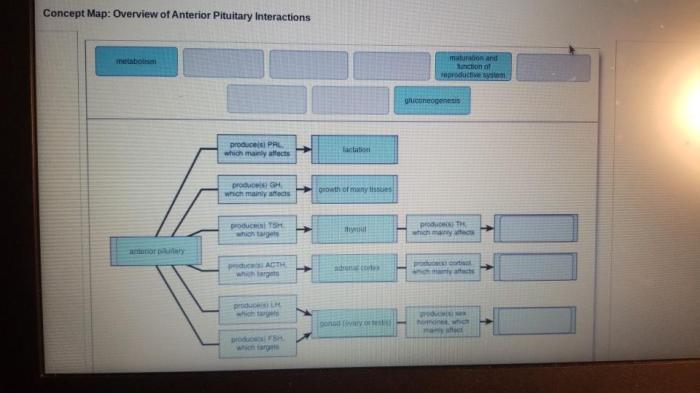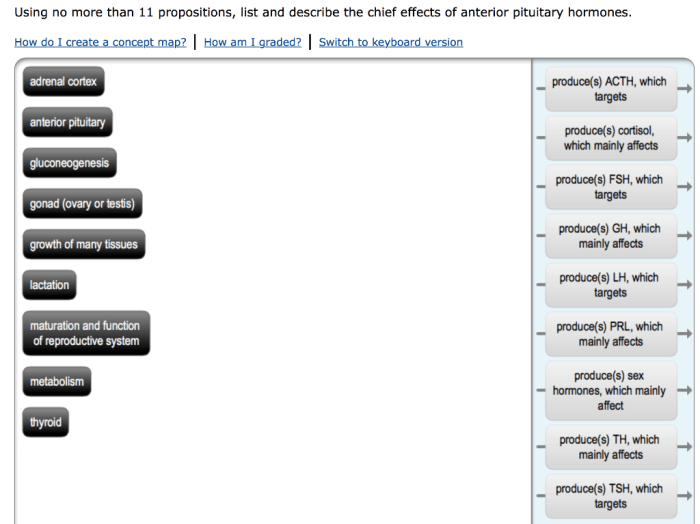The concept map overview of anterior pituitary interactions unveils a multifaceted realm of hormonal pathways and their profound impact on the endocrine system. This intricate network of interactions governs a wide spectrum of physiological processes, from growth and development to metabolism and reproduction.
Delving into this captivating overview, we will illuminate the key hormones involved, explore the mechanisms regulating their secretion, and examine the clinical significance of anterior pituitary hormone imbalances.
Overview of Anterior Pituitary Interactions: Concept Map Overview Of Anterior Pituitary Interactions

The anterior pituitary gland, a pea-sized structure located at the base of the brain, plays a crucial role in the endocrine system by regulating a wide range of physiological processes.
The anterior pituitary releases hormones that stimulate or inhibit the activity of other endocrine glands, forming a complex network of hormonal pathways that maintain homeostasis and respond to internal and external stimuli.
Key Hormones Involved, Concept map overview of anterior pituitary interactions
The anterior pituitary secretes several hormones, each targeting specific organs and mediating diverse physiological effects:
- Growth hormone (GH):Stimulates growth and development of tissues.
- Thyroid-stimulating hormone (TSH):Regulates thyroid hormone production.
- Adrenocorticotropic hormone (ACTH):Controls cortisol secretion from the adrenal glands.
- Follicle-stimulating hormone (FSH):Involved in reproductive function in both males and females.
- Luteinizing hormone (LH):Regulates ovulation in females and testosterone production in males.
- Prolactin:Stimulates milk production in lactating women.
Regulation of Anterior Pituitary Hormone Secretion
Anterior pituitary hormone secretion is regulated by a complex interplay of hypothalamic releasing and inhibiting hormones:
- Releasing hormones:Stimulate the release of specific anterior pituitary hormones.
- Inhibiting hormones:Suppress the release of specific anterior pituitary hormones.
The hypothalamus, located just above the pituitary gland, monitors various physiological parameters and releases these hormones into the pituitary portal system, which carries them to the anterior pituitary.
Clinical Significance
Imbalances in anterior pituitary hormone secretion can lead to various clinical conditions:
- Growth hormone deficiency:Short stature, delayed puberty.
- Growth hormone excess:Gigantism (in children), acromegaly (in adults).
- Hypothyroidism:Fatigue, weight gain, cold intolerance.
- Hyperthyroidism:Weight loss, rapid heartbeat, anxiety.
- Cushing’s syndrome:High cortisol levels, weight gain, moon face.
- Addison’s disease:Low cortisol levels, fatigue, weight loss.
Diagnosis involves blood tests to measure hormone levels and imaging studies to assess the pituitary gland.
Future Directions in Research
Ongoing research focuses on:
- Understanding the molecular mechanisms of anterior pituitary hormone secretion.
- Developing novel therapies for pituitary disorders.
- Exploring the role of anterior pituitary hormones in chronic diseases.
Advancements in this field hold promise for improved diagnosis, treatment, and prevention of pituitary-related disorders.
Questions Often Asked
What is the role of the anterior pituitary gland in the endocrine system?
The anterior pituitary gland serves as the master regulator of the endocrine system, orchestrating the secretion of hormones that influence growth, metabolism, reproduction, and various other physiological processes.
How are anterior pituitary hormone secretion regulated?
The secretion of anterior pituitary hormones is primarily regulated by hypothalamic releasing and inhibiting hormones, which act as chemical messengers between the hypothalamus and the pituitary gland.
What are some examples of clinical conditions associated with anterior pituitary hormone imbalances?
Clinical conditions associated with anterior pituitary hormone imbalances include growth hormone deficiency, Cushing’s syndrome, and prolactinoma, each characterized by distinct symptoms and requiring specific treatment approaches.


